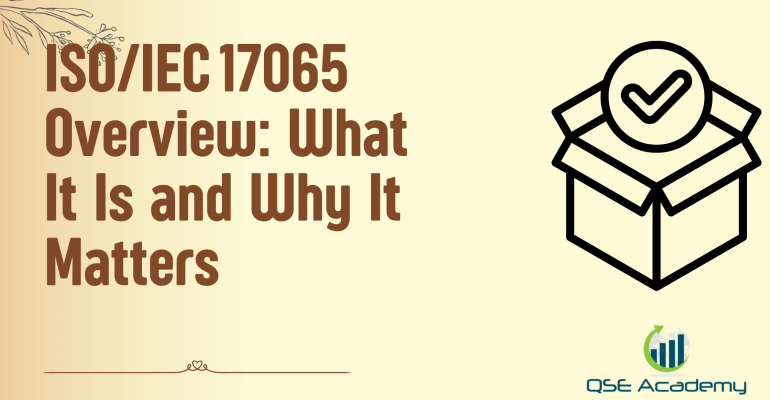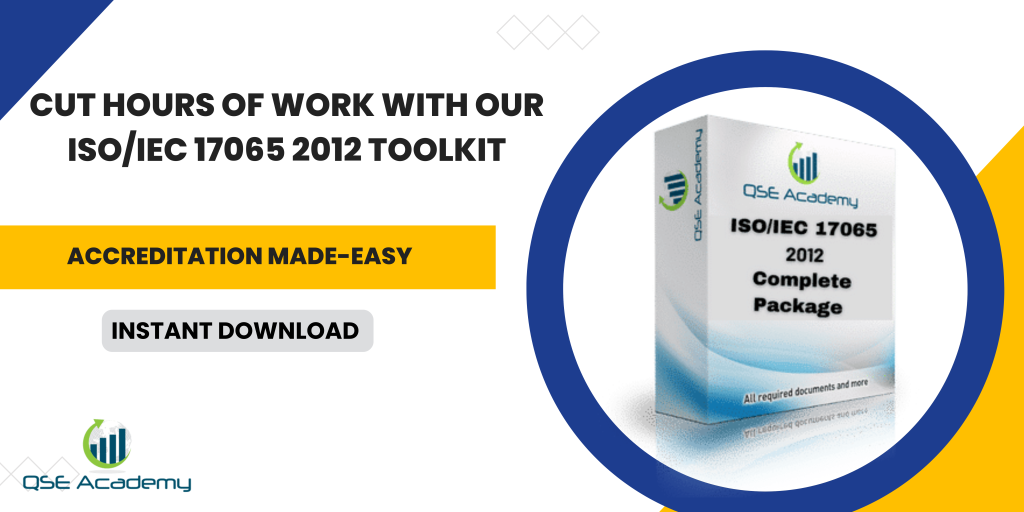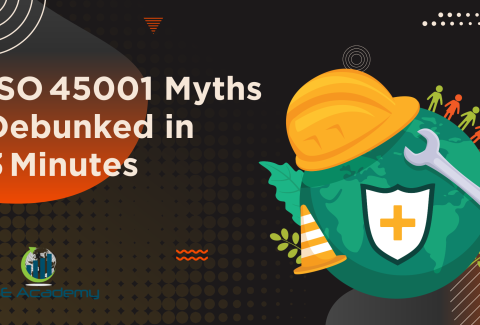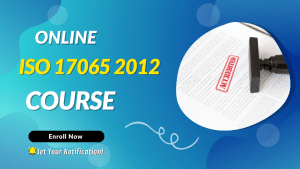ISO/IEC 17065 Overview: What It Is and Why It Matters
Last Updated on December 23, 2025 by Hafsa J.
Why This Standard Deserves Your Attention
ISO/IEC 17065 sits at the core of product, process, and service certification.
It defines how certification bodies must operate to ensure that their decisions are impartial, technically valid, and globally accepted.
I’ve worked with certification bodies of all sizes, and the same pattern shows up: the moment they understand ISO/IEC 17065 properly, their certification system becomes clearer, more structured, and easier to defend during accreditation.
This pillar article gives you a solid, accessible overview—what the standard is, where it fits in the conformity-assessment ecosystem, and why it matters when you’re building a credible certification program.
What ISO/IEC 17065 Actually Is
ISO/IEC 17065 is the international standard that outlines how a certification body should operate when certifying products, services, or processes.
Its purpose is simple:
ensure every certification decision is impartial, competent, consistent, and evidence-based.
The standard builds trust by requiring strong governance controls, clear evaluation rules, and documented processes that can stand up to regulatory and global scrutiny.
Pro Tip: When deciding whether ISO/IEC 17065 applies to you, ask yourself one question: “Am I certifying a product, service, or process based on defined requirements?” If the answer is yes, the standard is your reference point.
 Why ISO/IEC 17065 Matters Globally
Why ISO/IEC 17065 Matters Globally
Trust doesn’t happen automatically in certification. It needs structure, oversight, and evidence.
ISO/IEC 17065 provides that foundation.
Here’s why certification bodies rely on it:
- Global recognition: Accreditation under this standard is accepted through ILAC and IAF networks.
- Regulatory confidence: Many sectors—food, cosmetics, construction, PPE—require accredited certification bodies.
- Market credibility: Clients and consumers trust certificates issued under an accredited framework.
- Consistency: Every evaluation follows documented, repeatable steps.
Common mistake: Treating certification like a transactional service instead of a regulated technical activity. That mindset leads to weak procedures, inconsistent decisions, and accreditation findings.
Who ISO/IEC 17065 Applies To
ISO/IEC 17065 isn’t limited to physical product certifiers. It applies broadly to any organization making formal certification decisions based on specific criteria.
This includes:
- Product-certification bodies (electronics, PPE, food, cosmetics, construction materials)
- Service-certification bodies (tourism standards, facility hygiene services, eco-cleaning)
- Process-certification bodies (food-handling processes, environmental processes)
- Scheme owners who define and manage certification programs
- Regulators whose national programs rely on accredited certification
Pro Tip: If your organization issues a “certificate of conformity” or a certification mark that clients use for regulatory or market access, ISO/IEC 17065 is your governing standard.
Core Requirements of ISO/IEC 17065
Here’s a crisp breakdown of what the standard requires—without unnecessary jargon:
Impartiality
Safeguards that prevent any conflict of interest from influencing certification decisions.
Competence
Evaluators, technical experts, and decision-makers must be qualified, trained, and assessed regularly.
Evaluation Process
A structured review of evidence: testing, inspection, sampling, documentation checks—whatever your scheme defines.
Certification Decision
Surveillance
Ongoing checks to confirm certified products or services still comply after initial approval.
Documentation System
Policies, scheme rules, procedures, appeals/complaints handling, confidentiality controls, and record-keeping.
Common pitfall: Allowing the same person to both evaluate and decide. It seems efficient—but it violates impartiality and leads to nonconformities.
How ISO/IEC 17065 Certification Works (Step-by-Step)
The certification lifecycle under ISO/IEC 17065 is structured, predictable, and fully documented:
- Application Review
Confirm client eligibility and scope. - Evaluation
Review product data, testing reports, inspections, or other evidence. - Review
Independent confirmation that evaluation results support the intended decision. - Certification Decision
Approve, refuse, maintain, suspend, or withdraw certification. - Surveillance
Follow-up activities to ensure ongoing compliance.
Pro Tip: Visual process maps help assessors understand your flow instantly and reduce misunderstandings.
Benefits of ISO/IEC 17065 for Certification Bodies
ISO/IEC 17065 strengthens your organization in multiple ways:
- Credibility: Clients see your certification as reliable and evidence-based.
- International acceptance: Thanks to ILAC/IAF recognition.
- Market edge: Many tenders and regulatory programs require accredited certification.
- Operational discipline: Processes become clearer and more controlled.
- Client confidence: Clear rules and transparent decisions reduce disputes.
- Risk management: Strong surveillance and impartiality controls minimize legal or compliance risks.
Anecdote (the only one):
A small sustainability-certification body I assisted struggled to gain acceptance from major retailers. After achieving ISO/IEC 17065 accreditation, their certificates were accepted nationwide and later across multiple regions. Their credibility increased almost overnight—not because they changed their technical work, but because they aligned their system with a globally recognized standard.
Where ISO/IEC 17065 Fits in the Conformity-Assessment Ecosystem
ISO/IEC 17065 is part of a larger ecosystem of standards, each with its own role:
- ISO/IEC 17021-1: Management-system certification
- ISO/IEC 17020: Inspection activities
- ISO/IEC 17025: Testing and calibration labs
- ISO 9001: Organizational quality management
ISO/IEC 17065 focuses on certification decisions related to product/service/process conformity, not audits or inspections alone.
Pro Tip: Use a responsibility matrix to separate roles and avoid mixing requirements from other standards.
How to Know If Your Organization Needs ISO/IEC 17065
Use these checkpoints:
- Do you issue certificates based on specific product or service requirements?
- Do clients rely on your decisions for regulatory or market access?
- Do you maintain a certification scheme or mark of conformity?
- Is technical evaluation part of your workflow?
If you answered “yes” to most of these, ISO/IEC 17065 is the correct framework.
How to Get Started With ISO/IEC 17065
Here’s a practical roadmap:
- Conduct a gap analysis
- Build or refine your certification scheme
- Document impartiality controls
- Establish competence criteria
- Create evaluation and decision procedures
- Prepare records and evidence-tracking
- Schedule a pre-assessment with your accreditation body
FAQs
Q1: Is ISO/IEC 17065 mandatory?
It depends on your industry. In regulated sectors, it’s often required.
Q2: Can small certification bodies become accredited?
Yes. The standard is scalable and size-independent.
Q3: How long does accreditation take?
Typically 6–12 months depending on maturity and documentation quality.
Q4: How is it different from ISO/IEC 17021-1?
17021-1 certifies management systems; 17065 certifies products/services/processes.
Conclusion: Why ISO/IEC 17065 Deserves a Central Place in Your System
ISO/IEC 17065 is more than a compliance document—it’s a foundation for credible, impartial certification.
It strengthens your processes, reinforces trust, and positions your organization for regulatory and international acceptance.
If you apply it correctly, your certification system becomes clearer, stronger, and far more resilient during accreditation assessments.
I hold a Master’s degree in Quality Management, and I’ve built my career specializing in the ISO/IEC 17000 series standards, including ISO/IEC 17025, ISO 15189, ISO/IEC 17020, and ISO/IEC 17065. My background includes hands-on experience in accreditation preparation, documentation development, and internal auditing for laboratories and certification bodies. I’ve worked closely with teams in testing, calibration, inspection, and medical laboratories, helping them achieve and maintain compliance with international accreditation requirements. I’ve also received professional training in internal audits for ISO/IEC 17025 and ISO 15189, with practical involvement in managing nonconformities, improving quality systems, and aligning operations with standard requirements. At QSE Academy, I contribute technical content that turns complex accreditation standards into practical, step-by-step guidance for labs and assessors around the world. I’m passionate about supporting quality-driven organizations and making the path to accreditation clear, structured, and achievable.










